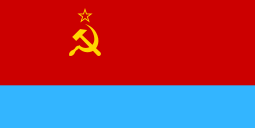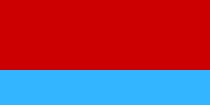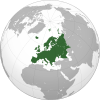Flag of the Ukrainian Soviet Socialist Republic
 | |
| Use | Civil and state flag, civil and state ensign |
|---|---|
| Proportion | 1:2 |
| Adopted | 5 July 1950 |
| Relinquished | 28 January 1992 (stopped being a national flag) 21 May 2015 (made the use of the flag illegal) |
| Design | A horizontal bicolour of red over azure (light blue) with the golden hammer and sickle and gold-bordered star on top of the canton |
 Reverse flag | |

The first flag of the Ukrainian Soviet Socialist Republic (UkSSR) was adopted on 10 March 1919 to serve as the symbol of state of the Ukrainian SSR. Details of the official flag changed periodically before the collapse of the Soviet Union in 1991, but all had as their basis the communist red flag. According to the decree of the Presidium of Supreme Soviet of Ukrainian SSR on 21 November 1949, the blue in the bottom "symbolises the mightiness and beauty of the people, and the blue banner of Bohdan Khmelnytsky".[1]
Color scheme
[edit]| Red | Azure | Gold | |
|---|---|---|---|
| RGB | 205/0/0 |
51/181/255 |
255/217/0
|
| Hexadecimal | #CD0000 |
#33b5ff |
#FFD900
|
| CMYK | 0/100/100/20 |
80/29/0/0 |
0/15/100/0
|
| Pantone (approximate) | 3546 C | 638 U | Medium Yellow C |
History
[edit]Before this 1919 flag, a flag in 1918 was used with red and blue, with yellow stripes in the canton.
The first flag was red with the gold Cyrillic sans-serif letters У.С.С.Р. (USSR, acronym for Ukrayinskaya Sotsialisticheskaya Sovetskaya Respublika (Ukrainian Socialist Soviet Republic) in the Russian language). A decade later, the Ukrainian initials У.С.Р.Р. appeared (USRR, for Ukrayinsʹka Sotsialistychna Radyansʹka Respublika). In the 1930s a gold border was added. In 1937, a new flag was adopted, with a small gold hammer and sickle added above the gold Cyrillic serif letters УРСР (the name had changed, transposing the second and third words).
-
Flag of the Ukrainian PRS
(1917–1918) -
Flag of the Ukrainian SR
(1918) -
Flag of the Ukrainian SSR (1919–1929)
-
Flag of the Ukrainian SSR (1929–1937)
-
Flag of the Ukrainian SSR (1937–1950)
The Soviet Union and two of its republics (Ukraine and Byelorussia) all became members of the nascent United Nations (UN) in 1945. Since all of their flags were red with only small markings in the upper left corner, the UN demanded changes to the flags in 1949.[2] To comply, the Ukrainian Soviet authorities dropped the lettering and added an azure horizontal stripe (1⁄3 of the width). The Ukrainian SSR adopted this new design as its official flag on 5 July 1950.[3] Other constituent republics of the Soviet Union soon followed suit and customised the bottom third of their flags.[2]
While the Soviet flag was flown in the later months of 1991, even after the failed coup d'état, the blue and yellow flag, even though it was a criminal offense under the Soviet law, was raised spontaneously throughout Ukraine by local activists between 14 March 1990 beginning at town of Stryi until the country's independence on 24 August 1991. The blue and yellow flag was provisionally adopted for official ceremonies in September 1991, although the Soviet-era flag officially remained until it was replaced on 28 January 1992.[4]
In 2015, all Soviet symbolism, including the flags of the Ukrainian SSR, was recognized as a symbol of the totalitarian past and officially banned in Ukraine. Despite the ban, the flags of the Ukrainian SSR have been used in the some areas occupied by Russia during the 2022 Russian invasion of Ukraine.[5]
-
Early variant of the flag of the Ukrainian SSR, before the unification of the hammer and sickle[6]
-
Flag of the Ukrainian SSR (1950–1991)
-
Flag of Ukraine (1991, unofficial co-flag)
See also
[edit]- Emblem of the Ukrainian Soviet Socialist Republic
- Anthem of the Ukrainian Soviet Socialist Republic
- Flag of Ukraine
- List of flags of Ukraine
- Soviet imagery during the Russo-Ukrainian War
References
[edit]- ^ "Flagi UkrSSR" Флаги УкрССР [Flags of the Ukrainian SSR]. www.vexillographia.ru. Retrieved 2017-12-22.
The azure colour symbolised the greatness and beauty of the people, as well as the "colour of the banners of Bogdan Khmelnitsky"
- ^ a b (Edmundas), Rimša, E. (2005). Heraldry : past to present. Vilnius: Versus Aureus. pp. 93–94. ISBN 9955601736. OCLC 67064469.
{{cite book}}: CS1 maint: multiple names: authors list (link) - ^ "Zakon URSR ot 05.07.1950, Pro zatverdzhennya Ukaziv Prezydiyi Verkhovnoyi Rady Ukrayinsʹkoyi RSR "Pro Derzhavny herb Ukrayinsʹkoyi RSR" ta "Pro Derzhavny prapor Ukrayinsʹkoyi RSR"" Закон УРСР от 05.07.1950, Про затвердження Указів Президії Верховної Ради Української РСР "Про Державний герб Української РСР" та "Про Державний прапор Української РСР" [Law of the USSR dated 5 July 1950, On Approval of Decrees of the Presidium of the Supreme Soviet of the RSFSR "On the State Emblem of the Ukrainian SSR" and "On the State Flag of the Ukrainian SSR"]. search.ligazakon.ua. Retrieved 2017-12-22.
- ^ "State flag of Ukraine as a symbol of peace and good will". Ukrayinska Pravda. Archived from the original on 19 May 2022. Retrieved 9 February 2020.
- ^ Young, Pareisa (11 March 2022). "Ukraine: Russian troops flying Soviet flag, symbol of 're-establishing Russian domination'". The Observers - France 24. Archived from the original on 27 April 2022. Retrieved 4 May 2022.
- ^ "Государственные гербы и флаги союзных советских социалистических республик". Retrieved 5 January 2022.
External links
[edit]- Ukraine in the Soviet Union (early flags), detailed history of flag designs






![Early variant of the flag of the Ukrainian SSR, before the unification of the hammer and sickle[6]](http://upload.wikimedia.org/wikipedia/commons/thumb/4/4b/Flag_of_the_Ukrainian_Soviet_Socialist_Republic_%28early_variant%29.svg/180px-Flag_of_the_Ukrainian_Soviet_Socialist_Republic_%28early_variant%29.svg.png)



